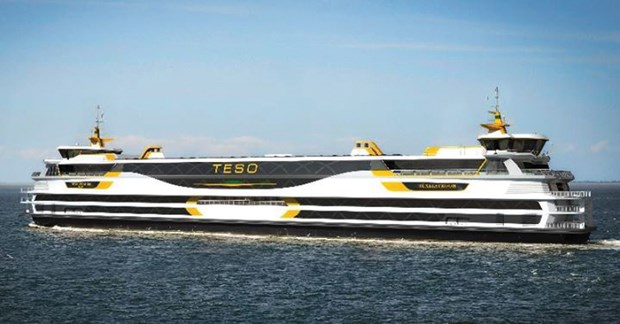A Richmond-based, high-tech battery manufacturing firm is helping produce what is being touted as one of the “greenest” ferries in the world.
Corvus Energy announced this week it is supplying a slew of its lithium ion batteries that form part of an advanced, hybrid propulsion system for the Texelstroom, a 1,750 passenger, 350-vehicle ferry being built for Dutch operator Teso.
According to company spokesman Grant Brown, the battery capacity of 1.6 megawatts provides enough power to run a small city, but in the case of the Texelstroom the energy will be employed as back-up power or to increase the vessel’s efficiency.
Construction of the ferry, which will ply the waters between Texel Island and the Dutch mainland, is expected to be completed by Spanish ship builder La Naval by the end of 2015.
Brown said the vessel was planned to be a hybrid from the keel on up. It uses low sulphur bio diesel and CNG (compressed natural gas) engines to create electricity for the propulsion system.
The batteries from Corvus Energy can be used exclusively instead of the fossil fuel-burning engines for a short duration of time — about half an hour — or minimal operations — steerage and position keeping — if other systems fail.
Helping replenish the batteries in addition to the engines’ generators is the Texelstroom’s 65-square-metre (700-square-feet) array of solar panels.
This is not the first time Corvus Energy has been involved with ships.
In 2013, it was part of a cost-saving retrofit of Scandlines’ Prinsesse Benedikte which runs between Germany and Denmark.
“Most shipping firms can justify spending $1 million for every one per cent of efficiency that is achieved,” Brown said. “With Scandlines, we were able to get an efficiency improvement of 25 per cent.”
Given that kind of return, building a ship from scratch to be an efficient hybrid can result in even more dramatic savings. But what is ultimately expected from the Texelstroom is not being openly discussed at this point, although reductions in operating costs are expected to foot the bill for the batteries in a span of just four years. Value of the contract to provide the ship’s battery system is not being divulged, said Brown, adding Corvus Energy is a privately held company with offices in the U.S. (Seattle), Nigeria, Singapore, and Delf Place in Richmond where 60 or so employees are responsible for manufacturing the batteries.
Brown said the lithium ion batteries produced locally are lighter than conventional lead acid types, and more reliable than nickel metal hydrate versions.
“With the reduction in weight, vessels can run more efficiently. And with the power storage capacity in the batteries there is less need for very heavy generators aboard that have to run continuously, burning up fuel.”
Brown added that Corvus Energy specializes in the application of battery technologies, leaving the research and development to other firms — in this case, South Korea’s Kokam.



